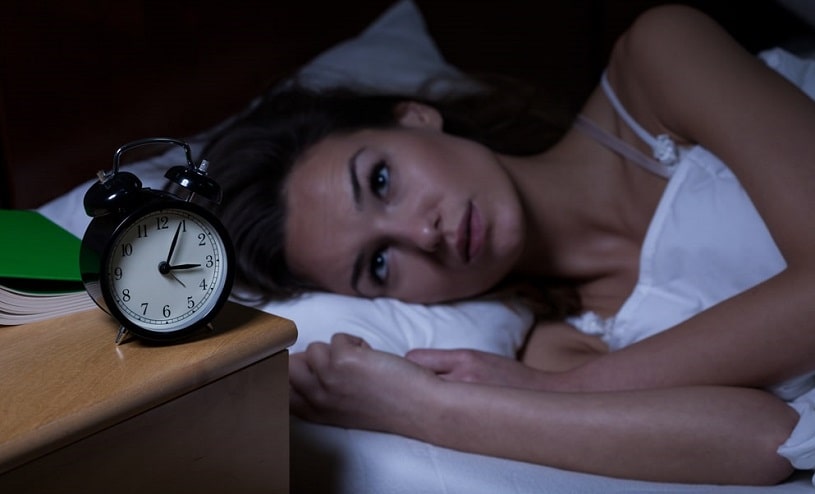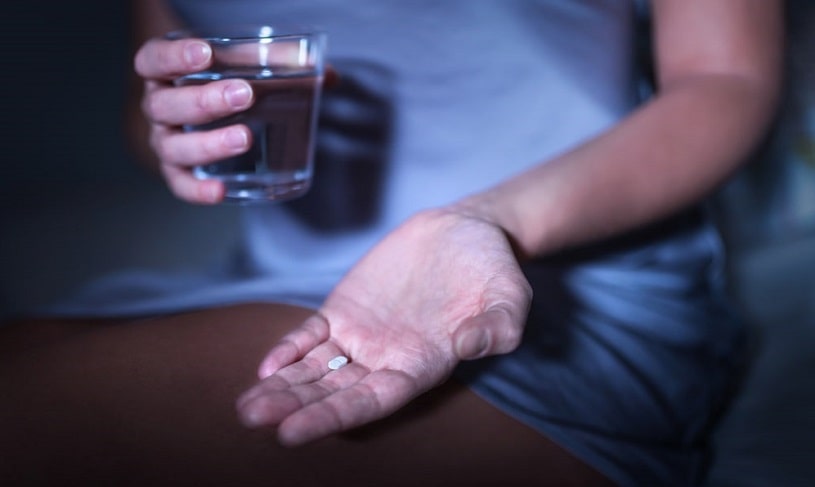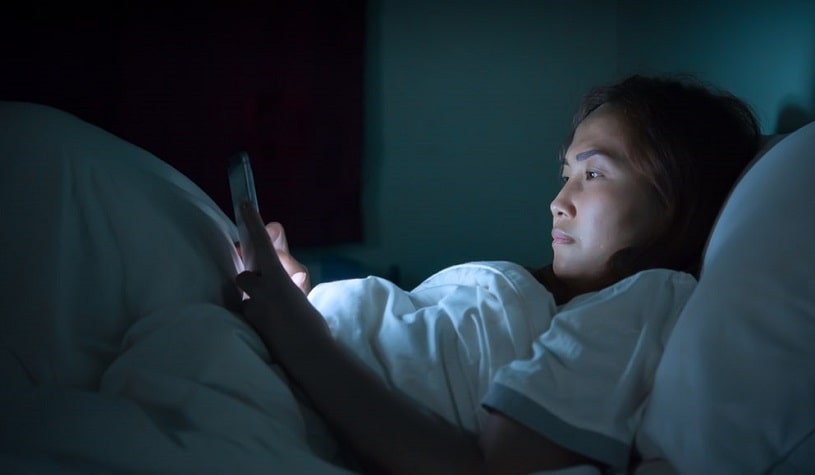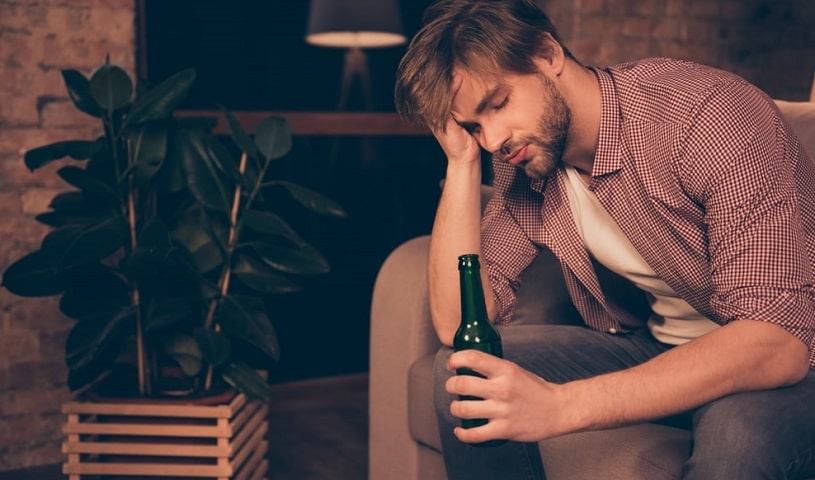It is no surprise that melatonin and alcohol mixture would present with health issues. They occur due to the similarities between both substances’ effects. Even though they do not precisely complement each other. Many medications rarely go well with ethanol. So, is it safe to take melatonin with alcohol? How terrible could the combination be?
Table Of Contents:
Some people think that melatonin (pineal hormone), a known natural sleep aid, may not be so harmful due to its origin. This is usually the basis for making serious mistakes that may be life-threatening either immediately or in the long run. In fact, there are origins of alcohol-insomnia troubles attached to this interaction.
Some people can’t sleep without alcohol, and as such, will typically take a drink when trying to sleep. This can be counterproductive as consuming alcohol will make it harder for one to achieve deep sleep, even if that sleep does come. The lack of deep sleep, especially long-term, will lead to the feeling that one is not fully rested the next day.

Similarly, taking melatonin with ethanol will cause more harm than good. One needs to be extra careful here because taking the mixture of alcohol and melatonin may be unintended as there are various possibilities by which the situation could occur. For instance, using mouthwash and other ethanol-based content while taking the pineal hormone may result in an alcohol and melatonin mix.
So, what happens if one takes melatonin with alcohol? This text takes a close look at the question and seeks to answer while providing other information about the health risks involved and the steps to take if one experiences a substance interaction involving the two.
Can You Take Melatonin With Alcohol?
A study revealed that over 70% of people living with some form of alcohol use disorder (AUD) suffer from alcohol-induced sleep problems. Some other studies also suggest that the percentage goes up to 91%. These numbers establish the basis for an educated fact that alcohol has a direct impact on sleep patterns.
Melatonin is a natural hormone that can be found in the human body and is produced by the pineal gland, usually during the night’s late hours. The function of this hormone is to trigger the feeling of sleepiness. This reaction, by nature, allows one to sleep. The pineal hormone is also made synthetically in laboratories to provide options for those with sleep disorders.
The body’s melatonin levels generally peak around 2 am to 4 am when a person would naturally be expected to be in a deep sleep. However, this peak level is stunted in people with alcohol use disorders because chronic alcohol consumption directly alters the natural production of melatonin in the body.

As an alternative to the naturally produced hormone, melatonin is available as an over-the-counter supplement in tablet, sublingual capsules, and liquid form.
People who can’t sleep without alcohol use the substance to induce sleep because, on its own, it is a depressant and creates the feeling of drowsiness. However, mixing melatonin with alcohol is not a good idea as the pineal hormone works to regulate the circadian rhythm (sleep cycles) day and night, while ethanol creates the same drowsy effect and a feeling of intoxication at any time of the day.
Pineal hormone supplements are recommended for people having trouble sleeping, and ethanol is a sedative that inhibits the production and activities of the pineal hormone in the body. The mix of both is counterproductive and can cause harm to the body in different ways. So, what are the possible risks associated with melatonin pills and alcohol?
Risks Of Mixing Alcohol and Melatonin
As earlier stated, liquor can disrupt the amount of pineal hormone produced in the body.
The Possible Side Effects of Alcohol on Sleep Are Discussed Below:
- Difficulty Breathing: the interaction of these two substances can cause the throat muscles to loosen up. This will make it hard to breathe normally because the throat collapses into itself when the muscles loosen up. Breathing difficulties can lead to other health problems in the long run.
- Sleep Problems: As suggested earlier, due to the counteracting nature of both substances, the effects of alcohol on sleep when mixed with melatonin especially are negative. While it does not necessarily mean that one will not be able to sleep, it means that when one does sleep, it is unlikely to be a deep sleep. Additionally, the chances of randomly waking up in the middle of the night or waking up at the slightest disturbance are greatly increased.
- Cardiac Dysfunction: Heart rate problems and cardiac dysfunction can also occur as a result of melatonin and alcohol interaction. One may find that heart rate reduces to a point lower than clinically safe, which is particularly dangerous for people with existing heart-related problems such as congestive heart failure, chronic heart failure, and other cardiovascular problems.
- Drowsiness: Ethanol and melatonin escalate drowsiness, making it impossible to drive, operate heavy machinery, and focus while doing sensitive tasks. This can lead to accidents.
- Anxiety: Mixing alcohol and melatonin can cause stress, which often leads to a spike in blood pressure and increased irritability.
- Other symptoms such as swelling of ankles and feet, face flushing, irregular heartbeat, dizziness, and shortness of breath may also occur.
Complications of Melatonin and Alcohol Interaction
Apart from the aforementioned symptoms, some severe complications may also arise from these two substances’ interactions. These complications occur mainly from the resultant effects of the interaction on the heart and liver, which inhibits the organ’s ability to produce some essential enzymes for the body.
The Complications are Listed Below:
- Feeling cold and shivering
- Increased heart rate
- Nightmares
- Nausea
- Headaches
- Fatigue
- Reduced attention span
- Difficulty focusing
- Rashes in the face
- Sudden unconsciousness
The risks of ethanol with melatonin are even more significant with pregnant women and breastfeeding mothers, which may affect the baby. Individuals with other health conditions such as bleeding disorders, diabetes, and high blood pressure are at significant risk of melatonin alcohol interaction.
Melatonin and alcohol death is quite rare, and even if it should occur, it would most likely be from underlying conditions or the sheer amount of ethanol taken. The pineal hormone reproduced in over-the-counter melatonin is relatively safe and is not lethal, even in extremely high doses. However, there will be negative health consequences.
Using Melatonin Safely
Firstly and most importantly, one needs to understand that each melatonin brand has specific instructions for usage, and these instructions should be taken as the rule for the amounts of the drug that should be taken at any given time. At the same time, it is still important to consult a qualified healthcare professional before using the drug to make sure that one has no health issues that may interact with melatonin.

A doctor would typically recommend 1 to 3 milligrams of the drug two hours before bed. It would also be helpful to dim the lights in the sleeping area to help stimulate natural melatonin production. Avoid blue light and bright screens before bedtime, and be sure to get enough light by sitting near windows or taking walks outside during the day.
One must avoid the drug entirely if pregnant, trying to get pregnant, or breastfeeding. Additionally, people living with an autoimmune disorder, people prone to seizures, or people who have depression should not use melatonin.
If one has high blood pressure or diabetes, the doctor must have a deep understanding of the person’s medical background before recommending melatonin. Side effects such as increased blood sugar levels can also be dangerous for people that are taking medication for hypertension.
It is usually recommended that melatonin dosage be stopped if one does not experience positive effects on the sleep-wake cycle after a week or two of use. The doctor would be in the best position to recommend an alternative in this case.
There are ways to ensure that one does not suffer the health issues associated with the mix of melatonin and alcohol. Alcohol has a short half-life of a few hours, and when digestion is complete, one can decide to take melatonin. Ideally, one must still consult a professional first. It is best to do so to understand the kinetics of each drug and its effective doses.
Can Alcohol Cause Insomnia?
There is a strong relationship between insomnia and alcohol, even in those who have not become alcohol addicts. Some people think that they drink alcohol for insomnia to help them fall asleep, but it has been scientifically proven that the opposite is true. Alcohol causes insomnia because it increases the time required to fall asleep, disrupts total sleep time, and raises the possibility of developing sleep apnea and snoring, both of which negatively impact sleep quality.
Unfortunately, this insomnia-alcohol connection is even stronger during the recovery process because of the disruptive effects that alcohol has on sleep continuity and can even become even worse for some time after one has stopped drinking. Alcoholic insomnia during withdrawal is caused by the body and mind adjusting to life without booze. In addition to experiencing nausea, tremors, and other physical symptoms, people trying to stop drinking often experience anxiety, excitement, and worries about the future. Also, people in inpatient recovery programs can find it hard to relax and sleep in a rehabilitation center’s unfamiliar environment.
What Are The Symptoms Of Alcohol Withdrawal Insomnia?
If one decides to stop drinking alcohol – either for the purpose of preparing to start a dosage of melatonin or for other reasons, it is essential to be aware of some possible withdrawal symptoms related to sleep that may occur – especially for long-term drinkers.
Some of These Symptoms are:
- Waking up during the night
- Inability to fall asleep again after waking up in the night (maintenance insomnia)
- Nightmares
- Problems with falling asleep (onset insomnia)
- A brief period of trouble sleeping (Acute insomnia)
- Problems falling/staying sleeping for three or more nights in a week - for three or more months in a row (chronic insomnia)
- Waking up tired
- Racing thoughts during the night
- Feeling tired during the day
- Sleepiness at odd times of the day
How Is it Dangerous For Recovery?
This condition can be a huge obstacle for a person trying to maintain sobriety. Insomnia can cause irritability and interfere with normal functioning. Sleep problems can also cause depression, anxiety, and even hallucinations.
Other Side Effects May Include:
- High blood pressure
- Congestive heart failure
- Hypertension
- Diabetes
- Chronic pain
Needless to say, sleep deprivation increases the risk of car crashes and work-related accidents due to lack of focus and thinking problems. Such issues can lead to relapse.
How Long Does Alcohol Withdrawal Insomnia Last?
To answer this question accurately, we need to make a distinction between acute withdrawal (often referred to as detox) and post-acute withdrawal. Acute withdrawal or detox refers to the period it takes to eliminate alcohol from the system physically. Insomnia during this period typically starts within eight hours of the last drink, peaks within one to three days, and can continue in some cases for weeks.

Post-acute withdrawal refers to a more extended period during which the body continues to experience uncomfortable symptoms as it adjusts to being without alcohol. Sleep problems during this period typically begin within three to five days after the last drink and can last anywhere from several weeks to several months after the initial detox/acute withdrawal period is over. Interestingly, this type of insomnia from alcohol may present in the form of excessive sleep for the first few days, followed by more extended periods without sleep.
When To See a Doctor
There are many ways that one may unintentionally mix melatonin with alcohol. The time of the day when this mixture occurs is also valid information as hormone pills are mostly taken before bed. Indulging in ethanol consumption in the evenings is reported to have a negative effect on a sleep schedule and may also present with side effects.
Ardent ethanol drinkers are most at risk as their ethanol tolerance is high, which means that the melatonin alcohol side effects would be more pronounced. Whether it’s a pineal hormone mix or some other medication such as Tylenol and alcohol, one should consult a doctor immediately to understand the extent of toxicity of both substances.
Best Practice
For safe melatonin use, the users must have a full understanding of the function and application of the medication as well as its side effects when misused. This can be achieved by consulting a doctor for advice on drug interaction. For those who have ethanol dependencies and are prone to experiencing these mismanagements, there are helpful alcohol addiction resources that can provide adequate treatment information as well as practical guides on how to overcome addiction to drinking.
There is no need to battle alcohol addiction alone. Addiction rehab centers provide help and support to individuals in need. Treating drug and alcohol addiction is a long process, but recovery is worth it.
Hope Without Commitment
Find the best treatment options. Call our free and confidential helpline
Most private insurances accepted
Page Sources
- Rupp TL, Acebo C, Carskadon MA. Evening alcohol suppresses salivary melatonin in young adults. Chronobiol Int. 2007;24(3):463-70. https://www.tandfonline.com/doi/abs/10.1080/07420520701420675?journalCode=icbi20
- Al Kury LT, Zeb A, Abidin ZU, Irshad N, Malik I, Alvi AM, Khalil AAK, Ahmad S, Faheem M, Khan AU, Shah FA, Li S. Neuroprotective effects of melatonin and celecoxib against ethanol-induced neurodegeneration: a computational and pharmacological approach. Drug Des Devel Ther. 2019 Aug 2;13:2715-2727. https://www.ncbi.nlm.nih.gov/pmc/articles/PMC6683968/
- Ekman, A. C., Leppaluoto, J., Huttunen. P. et al. ethanol inhibits melatonin secretion in healthy volunteers in a dose-dependent randomized, double-blind cross-over study. Journal of Clinical Endocrinology & Metabolism 77, 780–783. https://academic.oup.com/jcem/article-abstract/77/3/780/2649845
- Kuhlwein, E., Hauger, R. L. and Irwin, M. R. Abnormal nocturnal melatonin secretion and disordered sleep in abstinent alcoholics. Biological Psychiatry 54, 1437–1443. https://www.sciencedirect.com/science/article/abs/pii/S0006322303000052
- Gendy, M. N., Lagzdins, D., Schaman, J., & Le Foll, B. (2020). Melatonin for Treatment-Seeking Alcohol Use Disorder patients with sleeping problems: A randomized clinical pilot trial. Scientific reports, 10(1), 1-10. https://www.nature.com/articles/s41598-020-65166-y
- Danel, T., & Touitou, Y. (2006). Alcohol consumption does not affect melatonin circadian synchronization in healthy men. Alcohol and Alcoholism, 41(4), 386-390. https://academic.oup.com/alcalc/article/41/4/386/162611
- Kurhaluk, N., & Tkachenko, H. (2020). Melatonin and alcohol-related disorders. Chronobiology international, 37(6), 781-803. https://pubmed.ncbi.nlm.nih.gov/32419511/
- Conroy, D. A., Hairston, I. S., Arnedt, J. T., Hoffmann, R. F., Armitage, R., & Brower, K. J. (2012). Dim light melatonin onset in alcohol-dependent men and women compared with healthy controls. Chronobiology International, 29(1), 35-42. https://www.ncbi.nlm.nih.gov/pmc/articles/PMC4258345/




